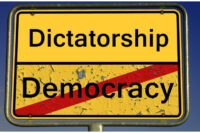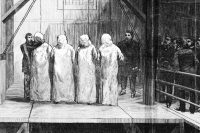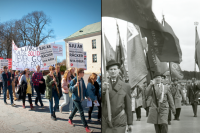Vid ett viktigt partimöte i Augsburg antog de tyska Socialdemokraterna, SPD, valplattformen inför valet 22 september. Gero Maass, som leder tankesmedjan Friedrich Ebert Stiftungs kontor i Stockholm, analyserar utvecklingen i en krönika på engelska.
Ten years after former SPD chancellor Schröder’s announcement of his famous Agenda 2010, the SPD party convention in Augsburg on 14th April approved its ’government’ program for the federal election on September 22. The program aims at providing greater solidarity and social justice, it tries to correct a couple of political decisions made during the Agenda 2010 and the former governing grand coalition. It also shifts the party more to the left; the major proposals include:
- Intensified redistribution of income by higher income taxes and the introduction of a wealth tax.
- Stricter regulation of the banking and financial markets, e.g. executive pay curbs, restrictions on high frequency trading and an Financial Transaction Tax.
- Partial re-regulation of the labour market, e.g. introduction of a general minimum wage of € 8.50 per hour, more restrictions on labour leasing, extension of employee participation in co-determination.
- Increased social security spending, e.g. minimum pension.
Many of the present proposals reflect the public reservation against the financial industry, and the growing unfair income redistribution.
In line with experts from the OECD and other institutions the SPD identifies the German education system as a source of inequality; the chance to receive higher education still depends very much on parental income. Consequentially, the SPD demands more and publicly financed primary education and all-day schools. Improvements in the education system shall be supplemented by the extension of the public unemployment insurance into employment insurance. Under certain conditions employed and unemployed persons will have extended entitlements for training.
The key element of the strategy against poverty, however, is a general minimum wage of € 8.50 per hour. The SPD draws a direct line from the expansion of the low-wage sector in the past decade and the risk of poverty. Today about 25 percent of all employed persons in Germany earn wages which are one-third below the average wage. In 2000 the respective share was only 20 percent.
Also in contrast to Schröder’s Agenda 2010 one will find the partial re-regulation of the labour market by more restrictions on labour leasing and (minor ones) on temporary work contracts. The SPD advocates equal pay and equal working conditions for leased workers and it wants to prohibit leasing companies employing workers temporarily for one leasing job only.
The most expensive measures in the long run will be the planned new benefits under the public pension scheme. This is especially due to the planned minimum pension of € 850 per month for retirees after a working life of a minimum of 30 years.
While according to current legislation, the pension level will decrease from currently about 50 percent to 42 percent in 2030, the SPD wants to stop the cuts at a level of 46 percent. Furthermore, the gradual increase in the retirement age from currently 65 years and 2 months to 67 by 2030, shall be suspended until at least 50 percent of those aged 60 to 65 have a job subject to social security contributions. According to the SPD, these measures will cost € 25 billion by 2030. But experts from the conservative governed federal labour ministry have calculated the costs to be as high as € 90 billion.
The election campaign will be shaped, above all, by personality issues, secondly by the stance towards the euro crisis, and only thirdly by some domestic social policy issues. Angela Merkel’s personal popularity is still strong, in particular her handling of the euro crisis. The SPD nominated Peer Steinbrück as its candidate last December. The former finance minister was the agreed as candidate since the party chairman, Sigmar Gabriel, refrained from running himself. Frank-Walter Steinmeier, candidate in 2009 and currently chairman of the faction in the Bundestag, also declared that he would not run.
Though Peer Steinbrück belongs to the group of most popular politicians in Germany he still suffers from a bad start, and his personal approval ratings are far behind the acting chancellor. Moreover, some unlucky personnel decisions regarding the campaign’s responsibilities have upset large part of the party administration in the headquarter.
Hence SPD’s campaign will only be successful if they can shift the focus from personal to political issues, and from the overall approved economic and financial situation and European policy of the Merkel government to future impacts of a growing social injustice. The SPD’s challenge here is that Peer Steinbrück’s image doesn’t incarnate the more lefty election programme.
Long-term polling indicates that the two dominant political camps of ”red-green” and ”black-yellow” usually run neck-and-neck. The recent Deutschland Trend report by polling institute Infratest-dimap underlines this.
Merkel continues to lead in the voters’ chancellor preference (58 to 26 percent). Reasons for this are not primarily related to substantial policy issues, but rather to personality. Merkel is seen as more sympathetic (52 to 24), more credible (51 to 22) and more reliable (53 to 20) in direct comparison to Steinbrück. In addition, Merkel is seen to have a clearer political course (49 to 26) – even if the electorate thinks that Steinbrück is expressing much clearer what he is thinking (61 to 22). However, 62 percent think he should express his opinions more diplomatically.
The Greens are hovering close to 17 percent; their highest figure since October 2011. Conversely the Pirates have a record low with two percent. At the moment the CDU/CSU would reach 40 percent of the vote, but the current black-yellow coalition could not be continued because the FDP remains just under the five-percent hurdle. The SPD drops back to 26 per cent, and Die Linke would currently reach 7 per cent of the votes.
Under these voting results neither a red-green nor a black-yellow coalition would get a majority, even if the FDP would pass the five-percent threshold. But Merkel could still remain in power, forming a grand coalition with the SPD or opting for the Greens as a junior partner since nuclear power – thanks to ”Energiewende” – no longer remains an obstacle for a ”Jamaican” coalition (black, yellow, green). Such a power option could bring the Greens under much internal pressure. The latest governing experiences in such a political constellation in the federal states of Hamburg and Saarland were disastrous.
But there are some optimistic scenarios for the SPD. The elections in the federal state of Lower-Saxony in March 2013 showed that red-green coalition can win even against an acting popular leader of the CDU. David McAllister (CDU) had even higher personal approval rates than Angela Merkel, and the SPD frontrunner Stephan Weil – a former mayor of Hannover – was quite unknown with a non-populist image of a quiet but serious politician.
Maybe the election in Lower-Saxony underlined an old rule in German politics, which gives some hope to the SPD. At the ballot box, the German voter still rely more on politics and parties than personal images.
Gero Maass is head of the Friedrich Ebert Stiftung’s Stockholm office for the Nordic countries
Följ Dagens Arena på Facebook och Twitter, och prenumerera på vårt nyhetsbrev för att ta del av granskande journalistik, nyheter, opinion och fördjupning.


































